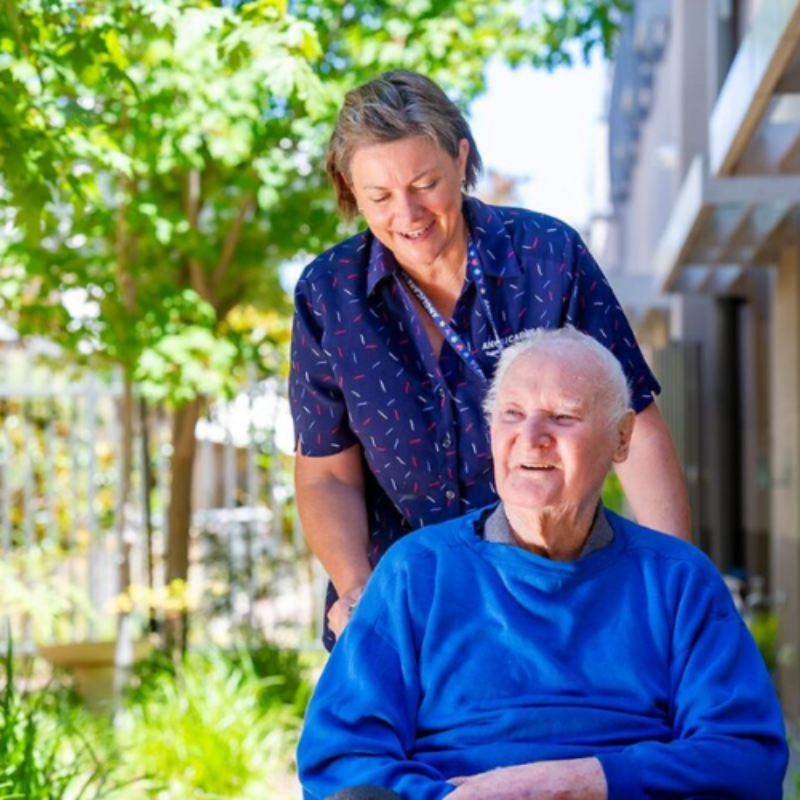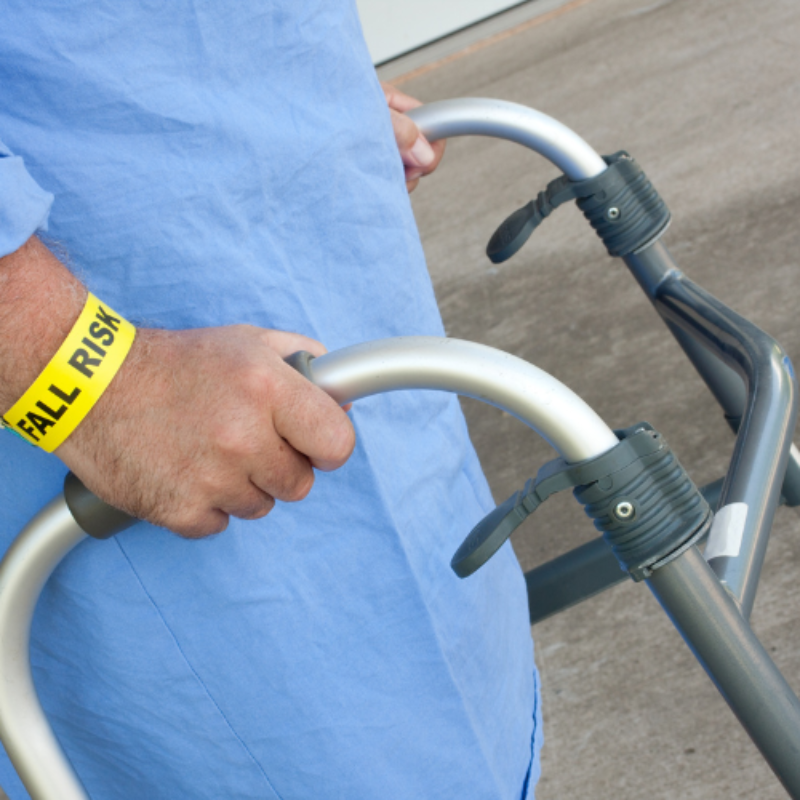Aged care providers need to deliver both compassionate care and operational efficiency.
Outdated communication systems exacerbated challenges for AnglicareSA, creating preventable risks and administrative burdens. Deploying Ascom alerting improved performance, facilitating better care and resident satisfaction.
Introducing AnglicareSA, a leader in residential aged care and social services.
AnglicareSA is a not-for-profit community services leader in South Australia. This includes managing six residential aged care homes, supporting residents to “continue living an enriching, healthy, and social life.”
At homes such as Grange and Brompton, both in Adelaide’s west, hundreds of senior Australians are provided comfort and care by a dedicated team of healthcare professionals, including 24-7 nursing, chefs and food service, care assistants, and allied health specialists.
Ikonix Technology supports the Residential Aged Care division, but AnglicareSA also delivers in-home and transitional care, retirement living, and other health and wellbeing programs.
Image provided by AnglicareSA.

When AnglicareSA started searching for a new nurse call and resident monitoring system, they found that many solutions were static and rigid. Available systems relied on wired monitors and call buttons and dispatched alerts to centalised or otherwise fixed locations.
These inefficiencies don’t just impact operations—they affect quality of life for residents and job satisfaction for caregivers.
The kind of system AnglicareSA desired was much more flexible, enabling resident mobility as well as having the capacity to expand and change. Importantly, they also needed a communication system that helped them deliver efficient and responsive care, to match or enhance their existing workflows, and help ensure the best resident and worker experience.

Older systems don’t solve current problems.
Reduced resident care minutes.
Out-of-date solutions lack real-time visibility into resident needs, reducing proactive care.
This creates inefficiencies in workflow and task management, which in turn reduces carers’ time directly with their residents. By wasting time on additional administration and other unproductive efforts, the care team have fewer minutes to spend with each resident.
This has obvious negative impacts to the wellbeing of that community, as well as raising potential compliance issues, as contact minutes are a regulated aspect of residential aged care.

Delayed emergency responses.
Sensor and detection technologies have improved to allow better monitoring of safety risks. A modern care setting needs enhanced event detection alerts that reach the right person in time for an appropriate response.
Older systems may see critical alerts being missed or routed to unavailable staff. Automated and escalating alerts ensure a swift and appropriate response, avoiding negative resident outcomes, such as delays while a fallen resident is in acute pain.

Staff frustration and burnout.
The care workforce is already spread thin, and all providers are looking to deliver more and better care with fewer personnel. Nurses might waste up to 30 minutes per shift tracking down colleagues or documenting incidents manually.
By updating their system for automated detection, customised workflows, and advanced reporting, AnglicareSA avoids disjointed systems lead to alert fatigue and communication breakdowns, which accumulate and impact the wellbeing of carers.

What the Ascom system delivers for AnglicareSA.
Initially deployed using the Myco 2 handset, Anglicare has maintained and expanded the system and now utilises the Ascom Myco 4 smartphone. The unified communication platform addresses their pain points holistically, delivering measurable benefits to the organisation, to frontline carers, and to residents—while providing families with much-needed peace of mind.
For AnglicareSA as an organisation:
Faster, more reliable emergency responses.
Residents wear as a pendant or wristband, a means to signal for assistance.
Staff are then alerted and routed to that resident. Automated escalation protocols reassign unanswered alerts within seconds. This reduces time wasted hunting down colleagues or responding to non-urgent alerts.
Data-driven decision-making.
Analytics dashboards track response times,
missed alerts, and staff workload patterns. This eliminates redundant data
entry, reducing administrative overhead, and can identifies operational
bottlenecks and contribute to alleviating regulatory compliance burdens.
For frontline carers.
Empowerment, not overload.
By carrying a single device to receive calls and messages from coworkers, as well as resident alerts, staff have the certainty they need for communication.
With automated alerts including from bed sensors, wander management, workers can respond directly to a concern and need not monitor their residents excessively or intrusively.
Durable and user-friendly design.
The Myco handsets are waterproof, drop-resistant, and easy to sanitise—built for healthcare’s demands. This means less maintenance and preservation or concern for their device.
A long life and hot-swappable battery also mean the carer does not have to be concerned about being out of contact or unable to receive their alerts.
For residents.
Faster assistance when it matters most
Bed exit sensor alerts trigger immediate responses from the closest available caregiver. Activating the pendant or wristband does the same. This means help is on the way as soon as the resident needs it, without constant personal supervision.
Proactive care and preserved Independence
Integration with bed or room sensors reduces manual check-ins which can feel intrusive to the resident. Mobile alerts additionally mean residents don’t have to wait near static call buttons, and are free to move around more independently, helping to keep them active and maintain the comforts of freedom and independence.
For families.
Peace of mind.
As concerning new stories arise due to stretched residential aged care resources and an ageing population, driving efficiency through technology benefits more than just the hosting organisation.
Knowing loved ones are on a monitored system eases anxiety about gaps in care. When placing a senior into a care facility, it is understandable that this comes with a degree of anxiety over the level and attentiveness they will be provided. Government regulations and reporting can only deliver so much certainty and accountability.
Improving how care facilities deliver for the residents helps achieve the required care minutes, to help maintain health and wellbeing for the resident, and peace of mind for their family.
"Caregiver prompt responsiveness to resident calls is a critical component to us, knowing that we can now send alerts directly to the appropriate caregiver will improve response to resident calls and delivery of better and more efficient care (and) will go a long way to help to improve the back-end support and frontline care management.”
Jacinta Robertson Head of Residential Aged Care at AnglicareSA.
The immediate and ongoing outcomes at AnglicareSA.
Following deployment, Anglicare asked their residents for their thoughts on the technology.
Residents were asked to rate their satisfaction with the system and care before and after the implementation of the solution.
- Customer satisfaction with response increased by 30%, and
- Satisfaction of care provision increased by 20%.
The residents found responses to be quick and the system user-friendly. Staff particularly appreciated being able to easily identify sources of information, as well as automated escalation under their workflows.

The bottom line:
In aged care, communication isn’t just about technology—it’s about connecting every part of the care experience to deliver better outcomes.
Residential aged care is an industry under pressure. While finding personnel and delivering required contact time will continue to be a challenge, technology such as the Ascom system will continue to play an important role in caring for elderly Australians.
Note: this case study updates and expands on an earlier edition, published by Ascom. This service is delivered in partnership between Ascom and Ikonix Technology.

